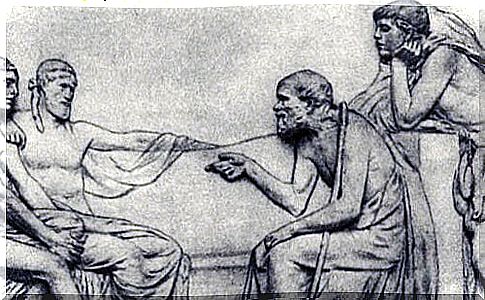Socrates’ Three Filters

Socrates’ three filters refer to an anecdote of the great Greek philosopher that survives to this day. This story is considered a great life lesson, which applies particularly to situations where gossip and rumors prevail.
It tells the story of the three filters of Socrates, who once saw one of his disciples in a great state of agitation. He told the philosopher that he had met one of his friends and that he had told him about Socrates with great disrespect.
Hearing this, Socrates asked him to calm down. After thinking for a moment, she asked him to wait a minute. Before hearing what he had to say, the message had to pass through three necessary filters. If he didn’t outgrow them, the message wouldn’t be worth hearing.
Socrates’ Three Filters
As was his custom, the Greek sage asked his eager disciple a question. The question was: “ Are you absolutely sure that what you are going to tell me is true ? ” The disciple thought for a moment. In fact, he couldn’t be sure that what he’d heard could be classified as disrespectful. It was all a matter of perspectives. ” So you do not know if it’s all true or not ” , said the philosopher. The disciple had to admit that he didn’t.

Then the great Greek teacher asked a second question: “ Is what you are going to tell me good or not? ” The disciple replied that it was evidently not good. The opposite. What he had to say to him were words that, in his judgment, would cause him discomfort and distress. Socrates said: ” You’re going to tell me something bad, but you’re not sure it’s true . ” The disciple admitted that this was the case.
Finally, Socrates had to ask a third question and so he did. He asked: ” What do you have to say about my friend serve me something ? ” The disciple hesitated. In reality, I didn’t know if this information would be useful or not. Maybe it would just distance him from that friend, but considering you didn’t know if it was true or not, maybe it wouldn’t be helpful.
The truth, goodness and usefulness
The anecdote of Socrates’ three filters tells that, in the end, the philosopher refused to listen to what his disciple wanted to tell him. “ If what you want to tell me isn’t true, it’s neither good nor useful, why would I want to know ? ” he said in conclusion.
Truth, goodness and usefulness are Socrates’ three filters. In the philosopher’s opinion, these are the questions that every person must ask before saying anything. The first: am I sure what I’m about to say is true? The second: what am I going to say is good? And the third: is it necessary to say that?

This triple filter is an excellent guide for both what we’re going to say and what we’re going to hear. It represents a set of parameters around what is healthy and constructive communication. That’s why this story is still valid despite the passage of centuries.
How to apply Socrates’ three filters
In everyday life, it is not easy to define what is true, what is good and what is necessary. These are abstract concepts that are sometimes difficult to apply. So there are also some additional questions that help you apply the three Socrates filters.
These questions are:
- True: do I know? Can I prove it? Would you be able to guarantee it in front of anyone? Would I be willing to risk my reputation for it?
- Good: does it benefit or make the other person or myself feel better? Will it awaken positive emotions? Will it improve the situation for the people involved?
- Necessary or useful: by knowing this message, will the person’s life or my life improve? Will this person be able to take some practical action with this information or message? How does not knowing harm or affect it?
As we pointed out at the beginning, Socrates’ three filters are particularly oriented towards rumors or gossip. By applying them, it is possible to stop annoying gossip in time. However, all this is also valid for other types of messages: those we receive through the media and social networks. Much of the information that circulates through these media is also of a dubious and insane nature.









